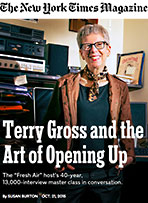Interview with the Interviewer,
Terry Gross
 For 40 years, the host of NPR’s Fresh Air, Terry Gross has connected listeners with the people that fascinate her, many of them authors.
For 40 years, the host of NPR’s Fresh Air, Terry Gross has connected listeners with the people that fascinate her, many of them authors.
In celebration of that anniversary, The New York Times Magazine turns the tables on Gross, interviewing the interviewer.
In a story enhanced by several photos (our favorite; Gross as a young woman working an enormous 70’s tape deck), writer Susan Burton offers an ode to NPR’s iconic questioner, reviewing her history and career trajectory, and discussing her acuity as an interviewer.
In particular Burton stresses Gross’s depth of knowledge on the subjects she discuses and her ability to create an intimacy with those she interviews, calling her our “national interviewer” and saying:
… think of it as a symbolic role, like the poet laureate — someone whose job it is to ask the questions, with a degree of art and honor. Barbara Walters was once our national interviewer, in a flashier style defined by a desire for spectacle. Gross is an interviewer defined by a longing for intimacy. In a culture in which we are all talking about ourselves more than ever, Gross is not only listening intently; she’s asking just the right questions … she’s deft on news and subtle on history, sixth-sensey in probing personal biography and expert at examining the intricacies of artistic process.”
This American Life‘s Ira Glass, no slouch as an interviewer himself, tells Burton:
There’ve been times when I’ve relistened [to an interview], just to hear the order of the questions and to figure out what was planned and unplanned. Like a magician sitting in on another guy’s act for two nights so he can figure out the trick, to steal it … [it is] not surprising that she loves jazz artists and stand-up comedians so much. She’s their journalist peer.
Being interviewed by Gross is a frequent fantasy of those who eventually make it onto her show and the process of talking to Gross is “a wish not for recognition but for an experience. It’s a wish for Gross to locate your genius, even if that genius has not yet been expressed. It’s a wish to be seen as in a wish to be understood.”
As an example, Burton highlights Gross’s 2011 interview with Maurice Sendak. The conversation turned to his death and Sendak said to Gross “I’ll go before you go, so I won’t have to miss you.’’
